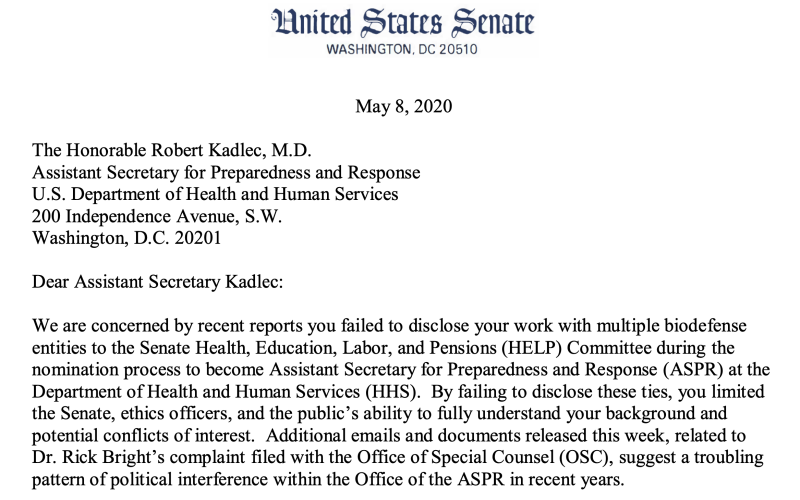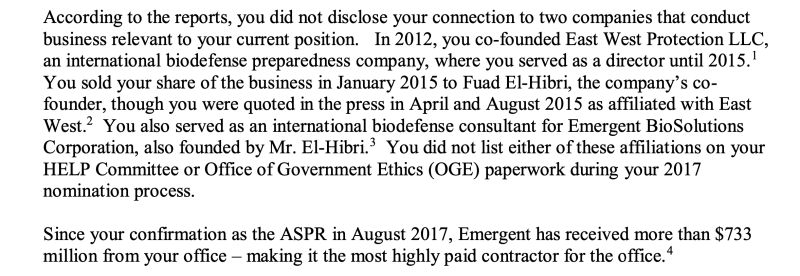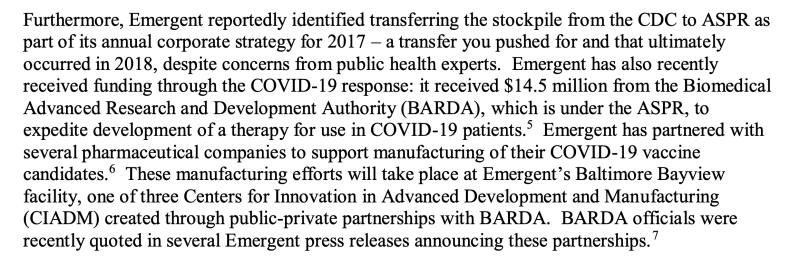When it comes to the business of vaccines and biosecurity, the land of free enterprise is all up for large-scale state intervention to create and prop up markets. Some of the generals behind the biosecurity ‘Manhattan Project’ believe the War on Microbes is too important to leave to politicians or Adam Smith’s invisible hand.
In June 2020, former Senator Bill Frist appeared before the Senate Health, Education, Labor and Pensions (HELP) Committee, reminding them he’d argued the need for this project fifteen years earlier.
‘I called for and had outlined “a greater than Manhattan Project for the 21st century” with no less than “the creation, with war-like concentration, of the ability to detect, identify and model any emerging or newly emerging infection, natural or otherwise; for the ability to engineer the immunization and cure, and to manufacture, distribute and administer whatever may be required to get it done and to get it done in time”,’ Frist told the Senate in his testimony.
‘We have a dangerously inadequate vaccine manufacturing base in the United States. This must be rectified. Bottom line: there’s so little profit and so much uncertainty in vaccine manufacturing today. We must establish longstanding public-private partnerships with industry that are sustained and are not at risk of disappearing with each [Congressional] appropriations cycle. We cannot expect the private sector to independently invest billions of dollars developing antivirals and vaccines for novel viruses that we hope we’ll never need to use. That’s not a sustainable business model.’
For some years to come, Frist asserted, this should be the chief work of the nation, ‘for the good reason that failing to make it so would be to risk the life of the nation,’
Whether this idea originated from Senator Frist is another matter. Dr Robert Kadlec, the ‘General Ripper’ behind this new Manhattan Project, and later the Covid Czar under Trump, was at that time the leading biosecurity official in President George W Bush’s administration. He was at the April 2005 National Academy of Sciences Pandemic Influenza Symposium where an unidentified participant called for funding for a Manhattan-like Project to protect against a pandemic, calling it an insurance policy.
But the groundwork for this Manhattan Project was being laid even earlier. In June 2001, two months before the 9/11 atrocity, the Johns Hopkins Center for Health Security (CHS) held a table-top exercise it called Dark Winter, simulating a smallpox bioterrorism attack on the US orchestrated by Osama bin Laden’s Al Qaeda. Dr Tara O’Toole, who founded the CHS in 1998, was the principal designer of the exercise, but Kadlec is credited with giving it its name. Colonel Randall Larsen, who’d hired Kadlec to work at the Air War College in the mid-1990s, was another designer of the exercise along with Tom Inglesby, the CHS’s current director.
Kadlec became the Homeland Security Director of Biosecurity Policy in January 2002 and soon after attempted to restart the smallpox vaccination programme. In 2004, he launched Project Bioshield, a $5.6 billion ten-year programme which created BARDA, the Biomedical Advanced Research and Development Authority. This was intended to motivate US pharmaceutical companies to start developing biodefence products (medical countermeasures which are principally vaccines) ‘by providing a substantial guaranteed market, expediting governmental contracting practices and clarifying FDA regulatory requirements for products used in a public health emergency.’
Project Bioshield funding enabled the US government to stockpile smallpox and anthrax vaccines manufactured by the companies Bavarian Nordic and Emergent BioSolutions. Both companies and the industry lobby group Biotechnology Innovation Organization were amongst the funders of Kadlec’s Bipartisan Commission on Biodefense he founded ten years later, in 2014, when he was working as a paid consultant to Emergent BioSolutions.The company, founded by Fuad El-Hibri and originally known as BioPort Inc, purchased a vaccine factory and the rights to manufacture anthrax vaccine for the US military in 1998.
On his appointment as Assistant Secretary for Preparedness and Response (ASPR) in 2017, Kadlec failed to declare a conflict of interests on his ethics forms, that in 2012 he and El-Hibri had co-founded an international biodefence company called East West Solutions LLC or that he had been employed by Emergent BioSolutions as a consultant.

In September 2019, when Kadlec was ASPR and in control of the US national stockpile, Emergent BioSolutions was awarded a ten-year $2 billion contract to replenish the US national stockpile of smallpox vaccine.

Emergent BioSolutions was later subcontracted to manufacture Covid vaccines for AstraZeneca and Johnson & Johnson in the US. However the company’s poor manufacturing standards led to a Congressional investigation being launched in 2021.

Since Covid, the ‘war on microbes’ has not let up: attention simply moved on to the next opportunity to promote a vaccine. Each outbreak seems to follow the oft-repeated pattern of having been preceded by a Strangelove-like situational simulation based on a fictional scenario. Outbreaks of disease, requiring the WHO to declare a public health emergency of international concern (PHEIC) and public health authorities to announce a vaccination campaign, have a strange knack of occurring soon after the simulation exercises, ensuring the public health community is well prepared in advance.
In December 2020, the Nuclear Threat Initiative (NTI), whose interim vice president is the former US Department of Health and Human Services Secretary Margaret Hamburg, conducted a consultation with experts for a table-top exercise on ‘reducing high-consequence biological threats’ in preparation for the exercise to run at the Munich Security Conference in March 2021. The scenario involved a fictitious monkeypox outbreak. Hamburg was herself a player in the June 2001 Dark Winter smallpox table top exercise and is a member of the Biodefense Commission.
At the 2021 Munich monkeypox simulation she was joined by a familiar roster of biosecurity figures including the ubiquitous Sir Jeremy Farrar, his old friend George Gao, the then head of the China CDC, Dr Chris Elias of the Bill & Melinda Gates Foundation, US Senator Sam Nunn who played the President in Dark Winter, Luc Debruyne, Vice President of CEPI, Dr Michael Ryan, Director of the WHO Emergencies Programme, with whom Anthony Fauci was in weekly contact in early 2020 during the time that Covid was escalated to a pandemic, and Arnaud Bernaert the WEF’s Head of Shaping the Future of Health and Health Care.
Bernaert, Gao and Elias were involved in Event 201, the coronavirus table-top exercise co-sponsored by the Johns Hopkins Centre for Health Security, the Gates Foundation and the WEF in October 2019. In the WEF press release for Event 201 Bernaert said, ‘We are in a new era of epidemic risk, where essential public-private cooperation remains challenged, despite being necessary to mitigate risk and impact. Now is the time to scale up cooperation between national governments, key international institutions and critical industries, to enhance global capacity for preparedness and response.’
In May 2022, the WHO declared a monkeypox outbreak which was escalated to a full-scale Public Health Emergency of International Concern in July 2022. Bavarian Nordic, the Danish headquartered vaccine manufacturer belonging to a Washington-based consortium called the Alliance for Biosecurity, signed a contract with an unnamed European country to supply smallpox vaccines for use as a monkeypox vaccine. The company is a sponsor of Kadlec’s Biodefense Commission, and its largest shareholder is ATP, Denmark’s national pension fund. Other notable entities amongst its top five shareholders include Vanguard Asset Management and Norway’s sovereign wealth fund Norge Bank.
The next part will examine how Kadlec began preparations for his Manhattan Project two years before the 2016 US Presidential election.
Reposted from TCW
Published under a Creative Commons Attribution 4.0 International License
For reprints, please set the canonical link back to the original Brownstone Institute Article and Author.









